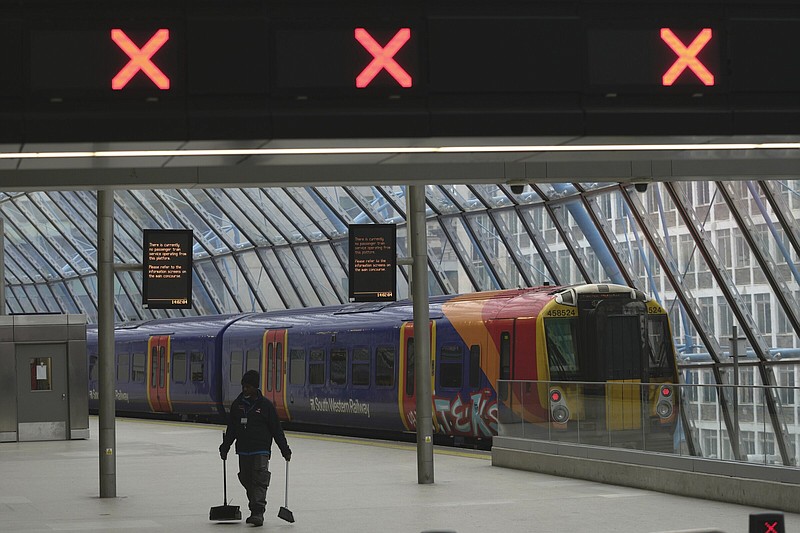LONDON -- Thousands of U.K. schools closed some or all of their classrooms, train services were paralyzed and delays were expected at airports as unions drastically stepped up pressure on the government Wednesday to provide better pay amid a cost-of-living crisis.
The Trades Union Congress, a federation of unions, estimated that up to 500,000 workers, including teachers, university staff, civil servants, border officials and train drivers, went on strike across the country. More walkouts, including by nurses and ambulance workers, are planned in the coming days and weeks.
Months of strikes have disrupted the daily routines of Britons as a bitter dispute drags on between unions and the U.K. government over pay and working conditions. The simultaneous strikes across multiple industries Wednesday marked an escalation of the unions' actions of late.
The last time the United Kingdom saw mass walkouts on this scale was in 2011, when more than 1 million public sector workers staged a one-day strike in a dispute over pensions. Others on strike Wednesday ranged from museum workers and London bus drivers to coast guard personnel and officers who staff passport booths at airports. The British Museum also was closed Wednesday because of the strikes.
Union bosses argue that despite some pay increases, such as a 5% offer the government proposed to teachers, the U.K.'s soaring inflation has plunged scores of public sector workers into financial difficulty because their wages have failed to keep pace. Teachers, health workers and many others say wages have fallen in real terms over the past decade, and the surge in living costs that began last year has exacerbated the problem.
The Trades Union Congress said Wednesday that the average public sector worker is $250 a month worse off compared with 2010 wages, accounting for inflation.
U.K. inflation stands at 10.5%, the highest in 40 years, driven by surging food and energy costs. While some expect price increases to slow this year, Britain's economic outlook remains grim. On Tuesday, the International Monetary Fund said the country will be the only major economy to contract this year, performing even worse than sanctions-hit Russia.
The National Education Union said some 23,000 schools were affected Wednesday, with an estimated 85% of the facilities being fully or partially closed.
"The government has been running down our education [system], underfunding our schools and underpaying the people who work in them," Kevin Courtney, the union's joint general secretary, said. "Primary schools, where you can't find special needs assistants because they're taking jobs in supermarkets where they are paid better, that's what's making people take action."
Prime Minister Rishi Sunak told lawmakers Wednesday the teacher strikes were "wrong" and claimed his government had already given teachers their biggest pay raise in 30 years. "Our children's education is precious, and they deserve to be in school today," Sunak said.
His office argued that pay increases for public sector workers would not be affordable for taxpayers and could lead to tax increases, more government borrowing or spending cuts elsewhere.
Union leaders blame the government for refusing to negotiate and offer enough to halt the strikes. Workers were also angered by the government's plan to introduce a new law to curb strike disruptions by enforcing minimum service levels in key sectors, including health care and public transportation.
Unions have criticized the legislation as an attack on their right to strike.
U.K. lawmakers backed the bill Monday. Thousands of people turned out Wednesday to protest the proposal in London, Manchester and other cities.
Trades Union Congress General Secretary Paul Nowak said unrest will continue until the government puts on the table an acceptable pay offer. "The message to the government is that this is not going to go away," he said. "These problems won't magically disappear."
